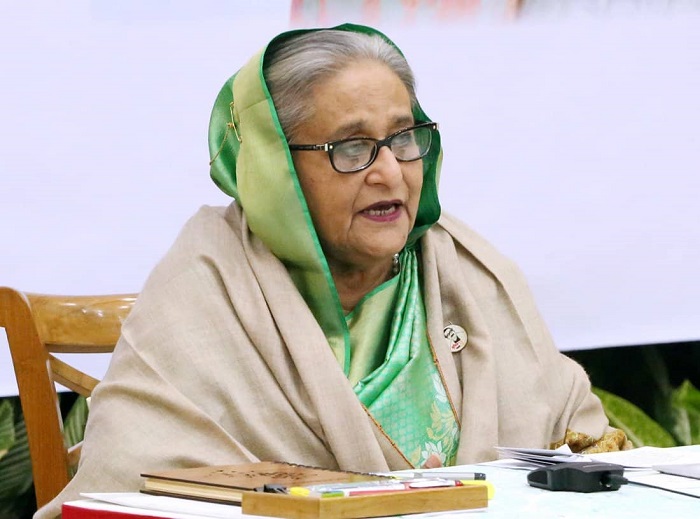Prime Minister Sheikh Hasina yesterday called for ensuring easy transfer of available technologies to developing nations so that they can face the toughest challenges of the 4th industrial revolution (4IR) in keeping pace with the developed countries.
Joining virtually the closing ceremony of a conference on the 4IR from her official Ganabhaban residence here, she said her government has been taking various time-befitting policies and measures to face the upcoming challenges of the 4IR.
The University Grants Commission (UGC) arranged the two-day international conference on the 4th Industrial Revolution at the Bangabandhu International Conference Centre here from December 10, marking the Birth Centenary of Father of the Nation Bangabandhu Sheikh Mujibur Rahman and the Golden Jubilee of country’s independence.
The Prime Minister said that the world is divided into two to create affordable and green value-chains as rich nations invent technologies and enjoy their utility, and some other countries are unable to invest in them.
She added that scientists believe that humans will have to coexist with artificial intelligence devices in near future and some new types of challenges have to be tackled.
“For example, machines will shrink the human workplace; demand for cheap labour will decrease, inequality will increase, and migration will be encouraged. Foreign investment in developing countries will reduce, and inequality in technological know-how will increase,” she continued.
The premier said that the 4th Industrial Revolution International Conference is a landmark step for development in the history of Bangladesh.
Industrialization aims to improve the quality of life of the people, create a market for new products, and accelerate the pace of the economy through employment, she said.
The premier added that the groundbreaking evolution of industrialization after almost 100 consecutive years is remarkable. “Passing the first, second, and third stages, we have reached the dawn of the fourth industrial revolution,” she added.
“I hope that the knowledge gained in this conference will create a strong rapport between our educational and industrial institutions. As a result, research and innovation related to the 4th Industrial Revolution will be easier to put into practice,” she said.
Since the formation of the government in 1996, she said, her government has focused on establishing IT infrastructure, formulating rules, and creating skilled citizens with technology. It has also introduced computer courses at secondary and higher secondary levels and SSC (vocational) courses in one school of each upazila, she added.
“We approved the establishment of 16 private universities and founded Bangabandhu Sheikh Mujib Medical University and Bangabandhu Agricultural University. We started the work of setting up 12 science and technology universities. We established 15 polytechnic institutes and three women’s polytechnic institutes,” she told the function.
The Prime Minister said they took effective measures by identifying 1176 highly polluting industries and banned two-stroke three-wheelers since 1998. Her government has withdrawn duty on all agricultural machineries, she added.
“We formulated up-to-date industrial policies to encourage the development of indigenous industries and investment. Intending to expand small and cottage industries, we established 57 industrial towns and started establishing another 13. In FY 2000-2001, we increased the power generation to 4,300 MW,” she further said.
She said the 1991-95 BNP regime refused to receive free fibre optic cable connections in Bangladesh. So, the country became isolated from global information technology highways, she added.
“We formed the government and adopted new policies to develop this sector. We took the initiative to build IT-Village and Hi-Tech Park to develop software, data-entry, and data-processing industries. We allowed duty-free import of computers, computer parts, and software,” she said.
She said that they prepared the ground for the development of information technology by breaking the monopoly on mobile phones and V-SAT installations.
The premier mentioned that in 1996, the number of mobile phones was only 2,000, and the price of each was more than 100 thousand Taka. In 2001, the number of mobile telephones stood at around 700 thousand, and the average price was Taka 7,000.
V-SAT made it easy to exchange data, which opened the door for computer data entry and software export, she said.
As a result, millions of people are employed to manufacture and assemble computer parts, make software, and do data processing, she added.
The Prime Minister said they have been working to build a Digital Bangladesh by 2021 as well as to introduce innovative technology in the industrial sector. “As a result, the number of internet users has now exceeded 120 million. We are launching 5-G Network Service soon. It will completely change the business model, education system, standard of living, and conventional digital and social media,” she said.
“We have transformed post offices into digital centres. We’ve connected Union Digital Centres to fiber optical cables, set up Sheikh Russell Digital Labs at educational institutions, and designed thousands of interactive content and e-books,” she said.
She continued: “We have added small/cottage industries to the e-commerce platform. We are making increasing progress in automation, software development, and freelancing. I believe that the ICT and software industry will lead our export sector in the future.”
The premier added that they are giving special incentives to overseas industries to set up research-development and manufacturing centres in Bangladesh.
“Many companies, including Nokia, Samsung, Huawei, are working in high- tech parks. In the manufacturing sector, we are adopting the ‘Circular Economic Model,’ through which we have started producing safe, recyclable, and long-lasting products using environmentally friendly technology,” she said.

